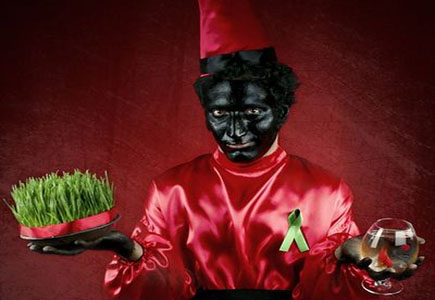CELEBRATE NOWRUZ

Haji Firuz is the traditional herald of Nowruz. He oversees celebrations for the new year perhaps as a remnant of the ancient Zoroastrian fire-keeper. His face is covered in soot and he is clad in bright red clothes and a felt hat. While ushering in Nowruz, Haji Firuz plays a tambourine and sings “Haji Firuz-e, sal-i-ye ruz-eˮ (It is Haji Firuz time, It happens one day in a year). People gather around him and his troupe of musicians and listen to them play the drum, saz or kamancheh, and dance through the streets with tambourines and trumpets spreading good cheer and the news of the coming New Year.
The month during which Nowruz celebrations are held is an extraordinary time in the life of the community. In ancient times, this aspect of Nowruz was so prominent that the mayors of towns were literally displaced by the most victorious person in carrying out the commands of Ahura Mazda and his six Spentas (holy immortal). This victorious (piruz) khwaja, or lord, was given the rule of the realm for the period. As a part of his duties, Khwaja Piruz saw to it that all the people of the realm were provided with the amenities and joy that were due them. In time, especially after the fall of Iran to the Arabs, who would not relinquish rule to defeated foes, the office of Khwaja Piruz deteriorated into its Arabized form, Haji Firuz. Only the duty of stimulating laughter and providing a good time has remained of what must have been a complex set of social affairs. Today, Haji Firuz is no more than a spectacle that occurs during the last few weeks before Nowruz. He and his troupe of musicians appear on the streets and alleyways all over the country. Known as the traditional herald of the Nowruz, Haji Firuz is a black-faced character clad in bright red clothes and a felt hat playing a tambourine and singing, “haji firuze, sali ye ruze.” (It is Haji Firuz time. It happens one day a year!). People of all ages gather around him and his troupe of musicians and listen to them play the drum, saz or kamancheh, and dance. Those who are impressed with the troupe’s performance shower it with coins and paper money.
Often, well-to-do Iranians invite Haji Firuz to their homes to perform for their wives and daughters who would otherwise never see Haji Firuz in action on the street. Here, the group plays popular folk music, performs a variety of comic routines, and tells jokes. At the end of the performance, the members are invited to a nice Nowruz meal and are handsomely compensated for their contribution with an eydi (Nowruz gift).
